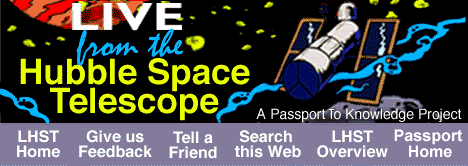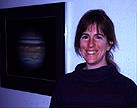


I'm a research astronomer at the Space Telescope Science Institute. Half of my job is to provide scientific advice for the people who maintain and who write software for the data "archive" for the telescope. The archive is the storage site for all of the data that comes from the telescopes and the scientific instruments on the telescope. Astronomers from all over the world want to use this data for their research, so I make sure that the archive and the software that organizes and accesses the archive data is helpful to these astronomers.
The other half of my job is devoted to scientific research. I study clusters of galaxies in order to learn about the origins and contents of the Universe (cosmology) and to study how galaxies evolve in dense environments. I use a lot of tools to do this, from space telescopes like HST to ground-based telescopes in Arizona and Chile, to computers to analyze data and to construct software-based models of clusters of galaxies.
The best things about my job is the freedom to pursue my research topics, the excitement of seeing something no one has ever seen before, and the fact that my husband, who is also an astronomer, has a job here so we can live in the same city and watch our daughter grow up together. The worst thing about the job is not so much a complaint about the job but the uncertainty inherent in the choice of astronomy as a career. There aren't many places where astronomers can find jobs in the country, so we are very limited in our choices of where to live. There are also very few astronomy positions in any one place (although the Baltimore area is one exception), so it is difficult to compete for these positions. I feel lucky, for now.
I've always been interested in astronomy but until I was 18, I never knew there was any money in it. I don't think I was fated to be an astronomer from an early age: I hated being outdoors at night (too many mosquitos or too cold on the Nebraska farm), I thought stars were boring and black holes a figment of my brother's imagination. My parents bought my brother a small telescope and we spent a cold, mosquito-y evening trying to point it at the moon. I'm not sure if we ever took it outside again.
But then I started reading science fiction. During one of my first babysitting jobs, I saw the movie 2001 on a late night channel. I started to think that it would be really cool to be a scientist, because they seemed to be having most of the fun in these books and movies, and scientists in space had the most exciting lives of all. I don't remember the first moon walk, but I do remember when the Apollo missions seemed like just another annual event: important but not particularly historic because it just seemed like space travel was something we were supposed to do in the natural course of events, no big deal.
I read everything about science I was allowed to remove from the public library. That's where I read about ham (amateur) radio. I wrote to the newspaper to ask about becoming a ham radio operator, and a very nice fellow wrote me to offer to start a class to teach kids to get their license and start up a little station. I met him, and he about fell over because he had expected me to be a boy. I didn't know why he thought that, I thought maybe he thought this way because he was kind of an old guy. But he went ahead and offered this weekly class. About 7 kids, between the ages of 11 and 13, took the class and got radio licenses. My brother and I set up a station in the basement and strung a dipole antenna along the length of our roof. It was fun, and we had Morse-code conversations with people from many different states and countries. That was probably the most science-oriented thing I ever did as a kid.
Our school was too small for science fairs; in high school, physics wasn't even offered every year. I did manage, through an indulgent school superintendent, to take advanced courses and spend a lot of senior year taking courses at a local college. I really had lots of help from this superintendent, who was also the parish pastor. He opened a lot of doors for me so that I wouldn't waste my time in study halls reading trashy novels. He left right after I graduated; the priest who replaced him was really repressive, so I'm glad I was gone by then.
I think the single most important choice I made with regards to my ultimately becoming a professional astronomer was going to MIT (Massachusetts Institute of Technology). Coming from a rural society, I didn't even know any engineers or scientists. I'd just read about them or seen them on TV. At MIT, I was exposed to a lot of science and technology, and I was immediately immersed in research activities at the Center for Space Research.
That was when I found out astronomy could pay off. Up until then I had either had sweaty, difficult farm jobs that paid minimum wage or boring bottom-line sales positions that paid less than minimum wage. By working with astronomers, I could make well over minimum wage and start to pay off college expenses while I was in college. And once I had a project of my own, where I could work with the data and derive interesting facts about astronomical targets, facts that hadn't been known until I worked them out, I was hooked.
No single person exerted enough influence for me to encourage me to pursue this field. But a lot of people were wise enough to allow me the space to find my own way. My parents, for example, had a lot of reservations about letting me go to MIT, but they didn't say a single negative thing about it, not even about the tuition. I had many dedicated teachers in high school (they HAD to be dedicated, they were working for dirt) who were pleased and excited for anything I tried. I think they would have been just as happy if I tried to be a novelist. (You see how I CAN go on.) My advisors in college and grad school always backed me. I think that I may remember the occasional negative voice ("You'll NEVER make a good scientist" -- a certain recitation instructor from MIT) more so than the positive ones because the negative voices were the strident exception.
In closing, to prove I indeed have a life outside of science, I met my husband in grad school (oops, maybe I don't! heh) and just last year we had our first baby, Michaela. She has been occupying a lot of our attention this year, but Mark and I like to run, hike, play doubles volleyball (sand preferably), climb mountains. In fact, we were all set to go to Nepal two years ago, but I was pregnant instead. We love to travel - we've been to Ireland and Britain, and explored the length of Chile. We're psyched to travel as much as we can, even with Michaela. She's already been on planes for 3 trips, so she's going to be a high air-mileage baby.

![]()